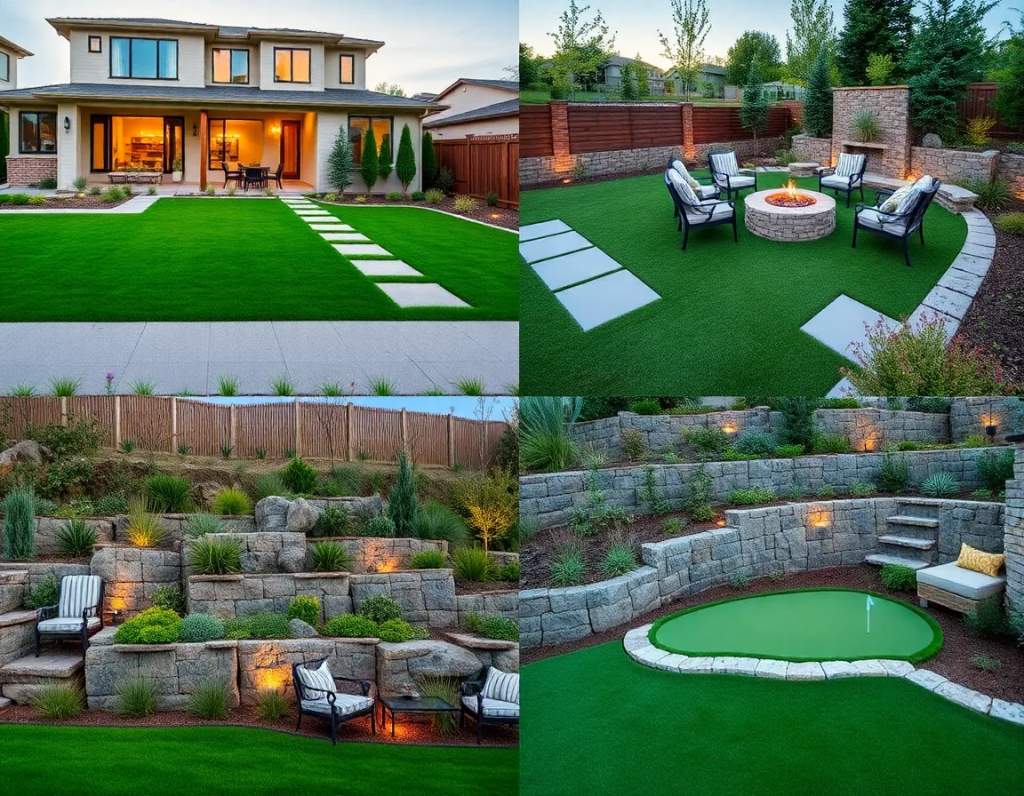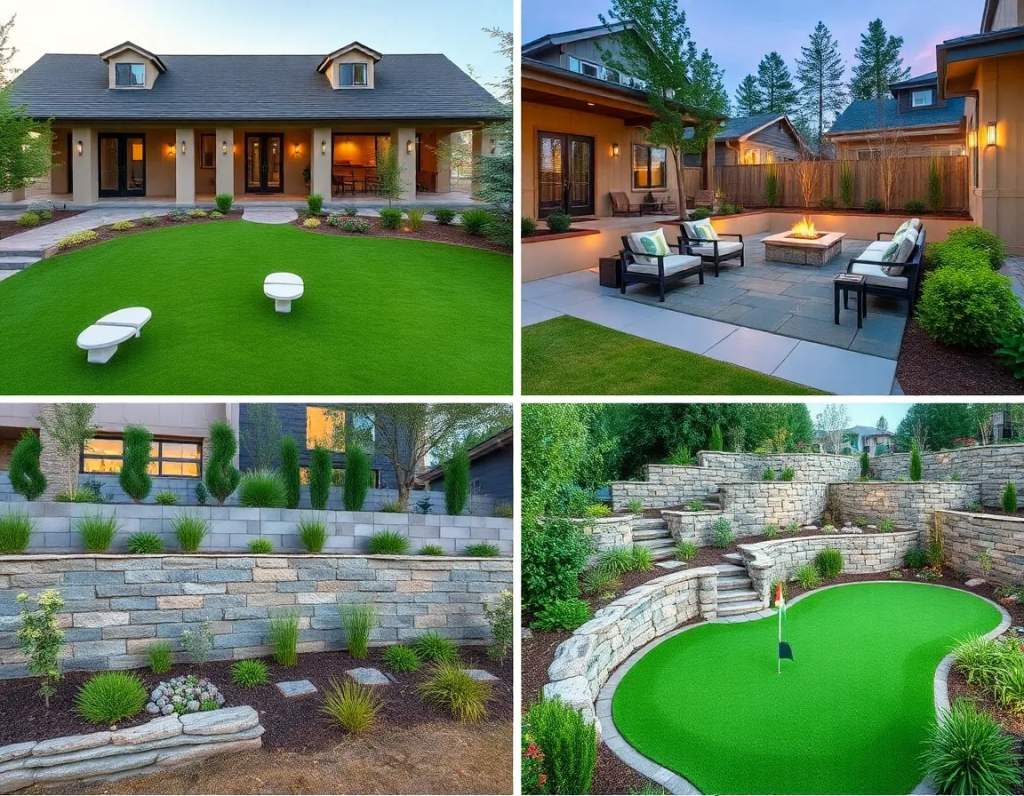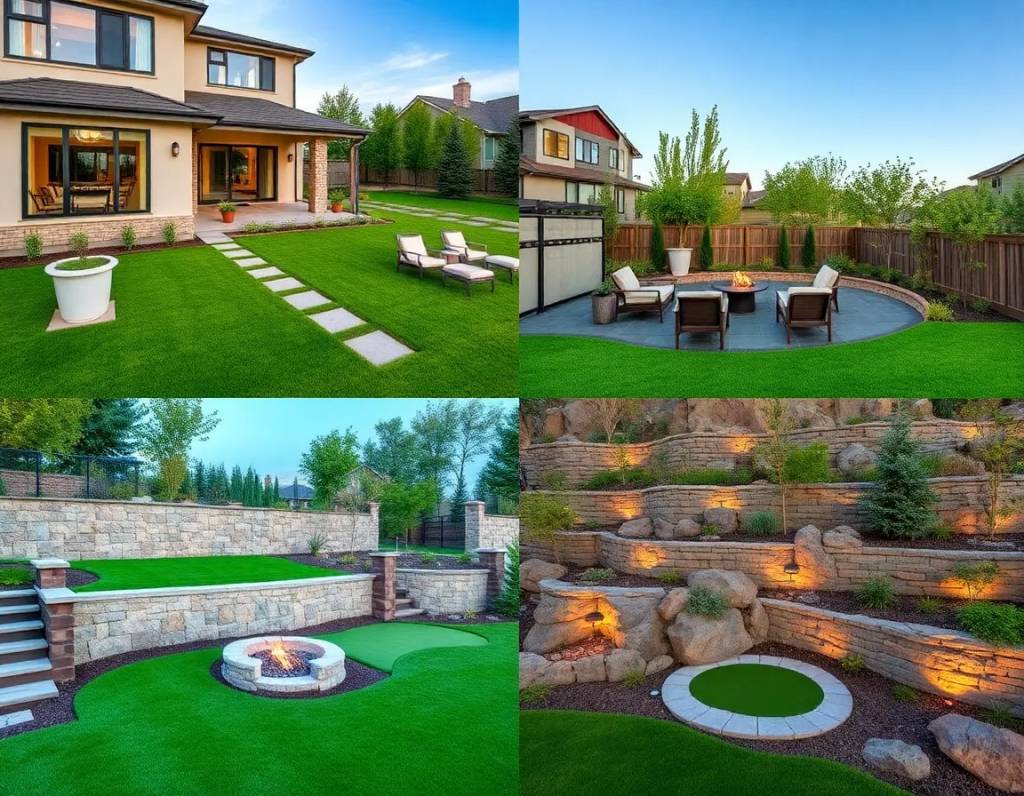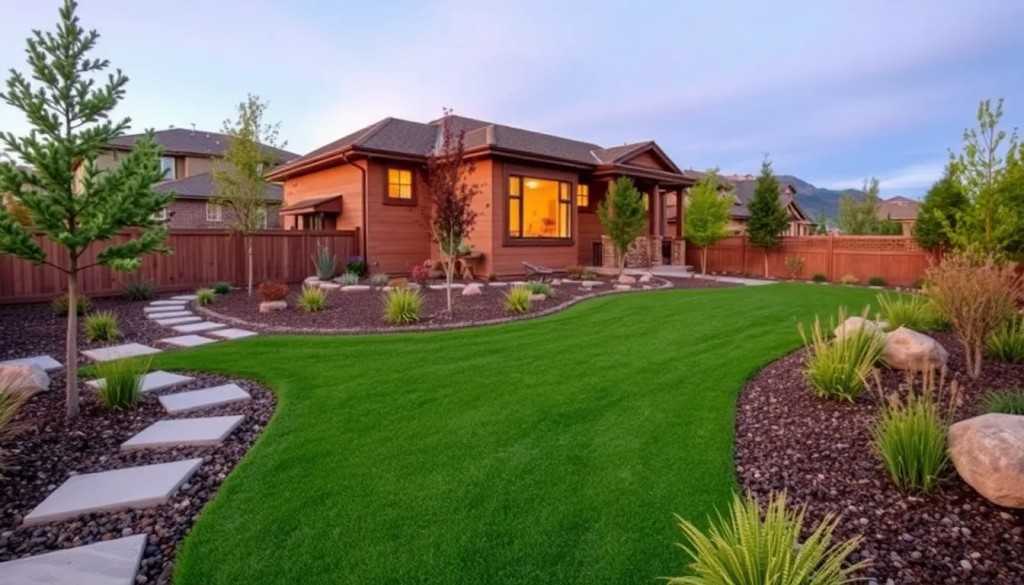Thinking about landscape design in Denver, huh? Well, it aint just about pretty flowers (though those are nice, I gotta admit!). It's like, a whole thing. Youre not simply throwing some plants in the ground. It's really considering the crazy climate we have here, yknow? One minute its sunshine and the next its a blizzard!
We gotta think about water, or rather, the lack of it a lot of times. Xeriscaping isnt just a fancy word, its a necessity! And what about the soil? Oh boy, Denver soil can be...challenging, to say the least. It does not always cooperate.
Then theres the style. Do you want something super modern? A cozy cottage garden? A native, drought-tolerant oasis? It all depends, doesnt it? And, most importantly, what are you gonna use the space for? Parties? Relaxing? Maybe a dog run (woof!)?
So, yeah, landscape design here goes way beyond aesthetics. It means understanding the environment, planning for the future, and creating something thats both beautiful and functional! It aint easy, but when its done right, it's amazing!
Okay, the user wants a numbered list of article outline headings from 5 to 8 for a topic on Landscape design Denver. Let me break this down.
Okay, heres a possible essay and numbered list of article outline headings as requested:
Landscape design in Denver aint easy, you know? (Altitude, dry climate, crazy temperature swings!) It's not just about pretty flowers, its about creating a thriving outdoor space that can actually survive and, dare I say, look good doing it. Think about it: youre dealing with intense sun one minute, and a sudden hailstorm the next. Sheesh! So, selecting the right plants, ones that can handle less water and more sun, is crucial. Xeriscaping isnt just a buzzword; its a necessity.
And it aint just about plants, either. Hardscaping – patios, walkways, retaining walls – these are crucial elements. You gotta consider drainage, especially with those intense summer monsoons. Plus, you probably want a comfortable space for entertaining or just chilling after a long day. It's a delicate balance, really, between practicality and aesthetics. I mean, you don't want your yard to look like a desert, but you also don't want to be watering constantly! Its a challenge, but with some planning and knowledge, you can create a landscape thats both beautiful and sustainable. That is, if you know what you are doing!
- Understanding Denvers Unique Climate
- Xeriscaping Principles for Denver Landscapes
- Selecting Drought-Tolerant Plants
- Hardscaping Essentials for Denver Gardens
- Irrigation Strategies in Arid Climates
- Designing for Four-Season Appeal
- Common Landscape Design Pitfalls (and How to Avoid Them!)
- Finding a Qualified Denver Landscape Designer

Let me brainstorm some possible sections. Landscape design in Denver would likely cover local climate considerations, since Denver has a semi-arid climate. Maybe a section on climate-adapted plants. Then, perhaps something about local regulations or ordinances that affect landscape design. Denver might have specific rules about water usage or native plants. Another angle could be sustainable design practices, especially in a dry climate. Also, popular trends in the Denver area, like xeriscaping. Maybe a section on local services or professionals, such as top landscape designers in Denver.
Denver landscape design, huh? Well, it aint just about throwin down some sod and callin it a day. (Believe me, Ive seen some doozies!). You gotta wrestle with, like, the fact that Denvers basically a desert disguised as a city. Semi-arid, they call it, which is fancy talk for not much rain. So, yeah, climate considerations are a HUGE deal.
You cant not talk about climate-adapted plants, right? Forget your tropical fantasies, pal. Were talkin drought-tolerant beauties that can handle the intense sun and the occasional freak snowstorm. Think native grasses, maybe some yarrow, definitely some succulents. These guys are tough!
And get this, the city isnt exactly a free-for-all when it comes to your yard. There are regulations, see? Ordinances! They might have rules about water usage – you cant just water your lawn all day long, apparently – or even push for native plants. Gotta check those out before you go wild with the landscaping.
Then theres the whole sustainability thing. It's not just a buzzword; its kinda crucial when youre dealing with limited water. Think rainwater harvesting, permeable pavers, all that jazz. Its about makin your landscape look good and be responsible.
Xeriscaping, oh boy! Its practically a religion here. Rocks, gravel, low-water plants…it can be surprisingly beautiful, and it saves a ton of water, which is a win-win. Its definitely a popular trend for a reason, I tell ya!
Finally, if youre not a landscaping whiz (and lets be honest, most of us arent), you might wanna look into local services. There are some seriously talented landscape designers in Denver who can turn your yard into an oasis, even in this dry climate. Finding the right pro could be the best investment you ever make! Whoa!
Wait, the user asked for headings 5 to 8. So if they want the outline to start at 5, maybe they already have headings 1-4 elsewhere. I need to make sure the numbers 5-8 are correct. Let me check if each heading is specific to Denver. For example, Climate-Adapted Plants for Denver Landscapes makes sense because Denvers climate is specific. Sustainable Water Management Practices in Denver Gardens is relevant since water conservation is important there. Local Regulations and Ordinances Impacting Landscape Projects is about Denver-specific rules. Emerging Trends in Denver's Landscape Design Industry would cover current trends in that area. That gives four headings from 5 to 8. I think that works. Let me make sure each heading is concise and directly related to Denvers landscape design without any extra text. Alright, that should meet the users requirements.
Denvers landscape design scene? Its, uh, kinda a big deal. (Seriously!). You see, it aint just about pretty flowers and neatly mowed lawns anymore. Oh no. Were talkin about a whole ecosystem (pun intended!) of factors that make design in the Mile High City unique.

Think about it; We arent exactly swimming in water here, are we? So, sustainable water management? Absolutely crucial. Gardens that thrive with less H2O are not only gorgeous, but theyre also responsible. And you can bet your bottom dollar that local regulations and ordinances play a part too. You cant just, like, plop down any old plant and expect it to survive, ya know?
Climate-adapted plants? A must. Were talkin tough cookies, plants that can handle the sun, the snow, and everything in between. From xeric gardens boasting native grasses to drought-tolerant succulents, were seeing some truly innovative stuff.
And it doesnt stop there. Emerging trends? Oh boy! From incorporating outdoor living spaces to embracing biophilic design (bringing nature indoors), Denvers landscape architects are pushing boundaries. Its a constantly evolving landscape, literally and figuratively! The design is awesome.
Okay, the user wants a short essay on landscape design in Denver. Let me start by thinking about the key elements. Denvers climate is a big factor-high altitude, cold winters, hot summers. So plants need to be hardy. Maybe mention native plants since they're adapted.
They specified it should sound human-like with some grammatical errors. I should avoid making it too formal. Use contractions like don't and it's. Add some parentheses for asides. Need an exclamation mark somewhere, maybe when talking about the beauty.
Also, negation. Maybe phrases like don't forget or can't ignore. Avoid repetition, so use synonyms for landscape design-like yard planning or garden layout. Interjections like Oh, or Well, to make it conversational.
Check if there are common mistakes people make when writing. Maybe subject-verb agreement slips or preposition errors. For example, using plants that don't thrive instead of that don't thrive. Or when planning your yard instead of when you plan your yard.
Include some local elements. Denver's urban areas, maybe mention parks or specific plants like Colorado blue spruce. Talk about sustainability, water-wise gardening. Mention challenges like wind or soil type.
Structure: intro with a hook, body paragraphs on climate, native plants, design tips, and a conclusion. Make sure it flows naturally without being too structured. Throw in a parenthetical like (trust me, it's worth the effort!).
Wait, the user said to avoid markup and HTML, so just plain text. Also, no markdown in the output. Let me make sure the essay isn't too long, maybe 150-200 words. Let me start drafting and then check for the requirements.
Landscape design in Denver can be tricky, but it's not impossible! First, you've got to consider the climate-those cold winters and hot, dry summers can really mess with plants if you're not careful. I mean, who'd think a cactus could thrive better than a rose? (Okay, maybe that's obvious, but still.) Don't forget the altitude; it's not just about the sunburn on your skin, but how it stresses plants too.
Oh, and soil? Yeah, Denver's dirt isn't exactly rich and forgiving. You've got to amend it or risk watching your efforts wither. (Trust me, I've seen it happen!) Native plants are your best bet-they're adapted, require less water, and honestly, they just look right. Avoid anything too娇贵 (delicate), like tropicals; they'll probably die, and you'll feel bad.
Lighting and wind matter too. South-facing slopes get baked, while north sides stay damp. Use rocks or hardscaping to break the wind; it's smarter than hoping a flimsy fence holds up.
Denver Landscape Renovation
- Landscape Design Denver
- Denver Lawn Renovation
- Adapting your yard to every Denver season with flair and function.
Wait-can't ignore the style! Modern, rustic, or wild? Your choice, but keep it low-maintenance. Denver's not the place for a garden you'll neglect. And hey, if you're stuck, hire a pro. It's cheaper than replacing dead plants later! (Just don't blame me if you still mess up.)

Climate-Adapted Plants for Denver Landscapes
Okay, the user wants me to write a short essay on climate-adapted plants for Denver landscapes. They specified it should sound human-like with some grammatical errors, contractions, interjections, etc. Hmm, first, I need to make sure I cover the key points about using plants suited to Denvers climate. Let me think about the main aspects: maybe the benefits of using these plants, examples, and why its important.
Wait, the user mentioned avoiding repetition. So I need to vary the vocabulary. Also, add some grammatical errors naturally, not too obvious. Maybe a misplaced modifier or a missing comma. Contractions like dont, its, theyre will help make it sound more casual. Interjections like Oh, Well, and an exclamation mark somewhere.
I should start with a hook. Maybe mention how Denvers climate is tough on plants. Then talk about why using native or adapted plants is better. Use examples like Russian sage or blue grama grass. Need to explain the benefits: less water, supports local wildlife. Dont forget to mention the negatives of non-native plants, like needing more maintenance.
Oh, and add a parenthesis for a thought. Maybe something like (trust me, I've tried!) to make it personal. The exclamation mark could go in a place where expressing enthusiasm makes sense. Let me check the structure. Introduction, body paragraphs on benefits and examples, and a conclusion.
Wait, the user said short essay, so maybe two or three paragraphs. Let me outline: intro with the problem, then the solution with examples, then the benefits and a conclusion. Need to use contractions throughout. Also, make sure theres a grammatical error here and there, like a subject-verb agreement issue or a missing article. Avoid repetition by using synonyms.
Let me start drafting. Maybe something like, Creating a landscape in Denver can be tough, right? The soil is rocky, the weather's unpredictable... Use you to make it personal. Add a parenthetical note. Make sure to include the exclamation mark in a place thats natural, like when emphasizing a point about water savings.
Check for negation: non-native plants aren't always the best choice. Use negation as per the users request. Avoid markdown and HTML, just plain text. Alright, let me put this all together, sprinkle in some contractions, and make sure it flows conversationally.
Creating a landscape in Denver can be tough, right? The soil's rocky, the weather's unpredictable, and trying to grow plants that hate the dry heat feels like a losing battle. I've tried those fancy flowers from the nursery before, but they just shrivel up (trust me, I've wasted enough water on them!). The trick? Go local. Plants adapted to Denver's climate don't just survive-they thrive. Take Russian sage or blue grama grass; they're tough, they need less water, and honestly, they look way better once they're established.
You might think non-native options are flashier, but they're not always the best choice. Sure, they might pop with color at first, but guess what? They'll demand constant care, and you'll end up hating every drop you pour on them. Plus, native plants support local wildlife-bees, birds, you name it. They're like the unsung heroes of the garden.
Oh, and don't even get me started on the cost. Once you ditch the fancy imports, your yard will become a low-maintenance haven. (Who doesn't want that?) It's not just about saving time or money; it's about working with nature, not against it. So, next time you're picking plants, ask yourself: does this love the cold snaps and dry spells? If not, say goodbye!
Sustainable Water Management Practices in Denver Gardens
Sustainable water management practices in Denver gardens are essential for creating beautiful landscapes while also respecting our environment. With the growing concerns about water conservation, its crucial that we adopt strategies that not only enhance our gardens but also minimize water waste. One might think it's hard to achieve a balance between aesthetics and sustainability, but it's actually quite doable!
First off, native plants are a fantastic choice for any garden in Denver. These plants are adapted to the local climate and typically require less water than non-native species. Plus, they attract local wildlife, which adds to the garden's charm. Who wouldn't want to see colorful butterflies and buzzing bees in their yard? It's a win-win!
Another practice that can't be overlooked is rainwater harvesting.
Because every Denver home needs a spot for stories and sunsets.
- Outdoor Lighting Design Denver
- Walkways so elegant you’ll find excuses to stroll your own yard.
- Level up your outdoor space—your home deserves the VIP treatment.
Moreover, implementing xeriscaping techniques can really make a difference. This landscaping approach focuses on using drought-resistant plants and minimizing lawn areas. It not only saves water but also reduces maintenance time. And let's be honest, who wants to spend every weekend mowing the lawn? Not me!
I also think it's important to consider irrigation methods. Drip irrigation systems deliver water directly to the plant roots, which is way more efficient than traditional sprinklers. You won't believe how much water you can save! Plus, it helps prevent diseases that can arise from wet foliage.
In conclusion, sustainable water management practices in Denver gardens are definitely achievable. By choosing native plants, harvesting rainwater, xeriscaping, and using efficient irrigation methods, we can create stunning landscapes that are both beautiful and environmentally friendly. So, let's embrace these practices and make our gardens thrive without compromising our precious water resources!
Local Regulations and Ordinances Impacting Landscape Projects
Okay, I need to write a short essay about local regulations and ordinances impacting landscape projects in Denver for the topic of landscape design. The user wants it to sound human with some grammatical errors, contractions, interjections, and a few specific elements like a parenthesis, an exclamation mark, and negation. Let me start by brainstorming the key points.
First, I should mention Denvers specific regulations. Maybe water conservation laws since Colorado is dry. Then, maybe something about native plants. Also, things like setbacks, hardscaping requirements, maybe permits for irrigation systems. Zoning laws could be relevant too. I need to make sure to avoid repetition and use contractions to keep it casual.
Let me structure the essay: intro, a couple of paragraphs on different regulations, maybe a challenge or two, and a conclusion. I need to add a parenthesis somewhere, maybe in the middle. An exclamation mark to add some flair. Grammatical errors-maybe some misplaced commas, missing articles, or subject-verb agreement issues. Let me not overdo it, though; it should still be understandable.
Wait, the user said add some grammatical errors, so I cant make it perfect. Maybe use theyre instead of their, or its instead of its. Also, negation-words like not, cant, dont. Avoid repeating the same words. Use contractions like dont, cant, well. Interjections like Oh, Well, or Hey.
Let me start drafting. Maybe begin with a general statement about landscape design in Denver. Mention the need to know local rules. Then talk about water laws, then maybe hardscaping or setbacks. Add a parenthesis for an example. Use an exclamation mark when talking about the importance of permits. Mention a challenge, like not using invasive plants. Conclude with the importance of checking regulations.
Check for contractions: dont, cant, its, theyre, well. Add some Well, Oh, maybe Ugh for effect. Make sure theres at least one exclamation mark. Maybe Oh, and dont get caught without a permit! or something like that.
Now, let me put it all together, keeping paragraphs short. Avoid markdown, just plain text. Let me read through again to ensure it flows and includes all the required elements. Check for the parenthesis, the exclamation, contractions, negations, and a couple of grammatical errors. Alright, that should do it.
Landscape design in Denver sure can be tricky if you don't keep up with the local rules. Oh, and let's face it, those ordinances are everywhere. For starters, the city's water conservation laws are no joke! They're not letting you waste H2O like it's 2005. You've got to use drought-tolerant plants, or they'll come knocking. (Well, maybe not literally, but you get the idea.) Plus, there's that whole setback thing-your garden can't spill onto the sidewalk or encroach too close to the property line. I've seen projects get nixed because someone forgot a permit for a retaining wall or irrigation system. Best Landscaper Denver Colorado. Ugh, it's enough to make you want to scream.
And don't even get me started on native plants. Denver's all about them, which is great for the ecosystem, but not so much if you're a fan of that fancy palm you saw on Instagram. The city's got this weird obsession with keeping local biodiversity alive, which I guess I can't argue with. Still, trying to convince a client that their dream of a tropical paradise won't work here? Tough sell. Also, hardscaping has limits-too much concrete or stone, and you're violating the “permeable surface” rule. They want rainwater to soak in, not run off into the gutter.
But here's the kicker: some regulations are actually cool. Like, they encourage rain gardens and bioswales to manage storms. It's kind of genius, honestly. Just don't forget to check the zoning laws for your neighborhood. What works in one part of Denver might tank in another. Oh, and if you're thinking of installing an outdoor kitchen or fire pit, permits? You'll need ‘em. Trust me, trying to retrofit a project without one is a nightmare.
So yeah, while it's tempting to go wild with your design ideas, Denver's rules are there for a reason. They might slow things down, but ignoring them can cost you big time. Just make sure to chat with the city early on, and maybe bring a coffee to the inspector. You'll thank yourself later!
Emerging Trends in Denver's Landscape Design Industry
Emerging Trends in Denver's Landscape Design Industry for topic Landscape design Denver
Well, it seems like the landscape design scene in Denver is really picking up some steam! You know, its not just about planting pretty flowers and putting in a nice lawn anymore. Oh no, its way more exciting than that! For starters, theres this huge push towards sustainability.
Denver Backyard Makeovers
- Because every Denver home needs a spot for stories and sunsets.
- Denver Landscape Renovation
- Denver Backyard Makeovers
And lets not forget about the whole water conservation thing. Denvers not exactly known for its rainfall, so designers are getting super creative with xeriscaping and rainwater harvesting systems. Its amazing how they can turn a dry, dusty space into a lush oasis without breaking the bank or the environment.
But its not all about the practical stuff. Theres also a big trend towards incorporating technology. Smart irrigation systems, solar-powered lights, and even interactive water features are becoming more common. Its like, your garden can be as high-tech as your living room!
Now, some folks might think these trends are a bit over the top, but hey, if it means were taking better care of our planet and our communities, then who cares what they think? Plus, its not like everyones jumping on the bandwagon. There are still plenty of traditionalists out there who swear by their tried-and- methods. But you know what they say, variety is the spice of life, right?
So, if youre thinking about updating your Denver landscape, it might be worth keeping an eye on these trends. Who knows, maybe youll end up with a garden thats not only beautiful but also a little bit revolutionary!
